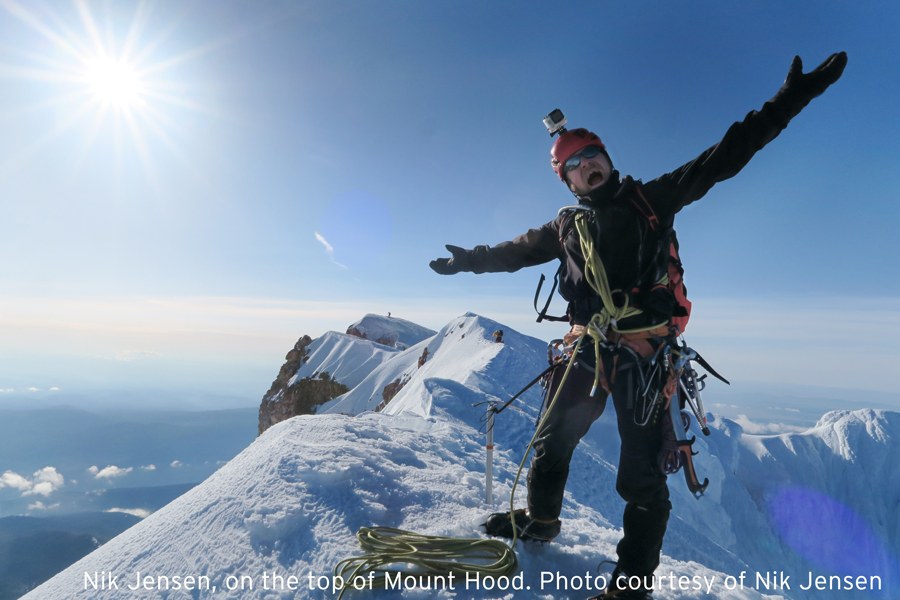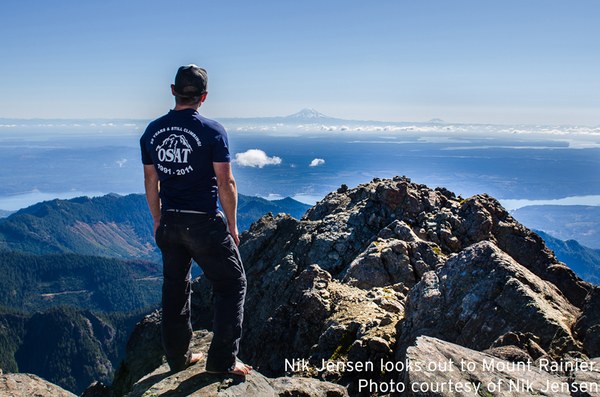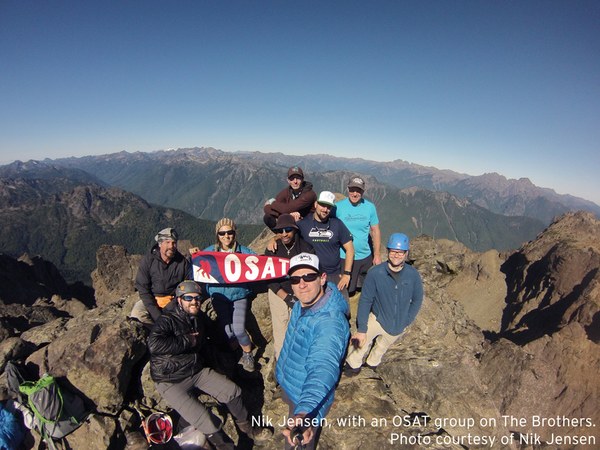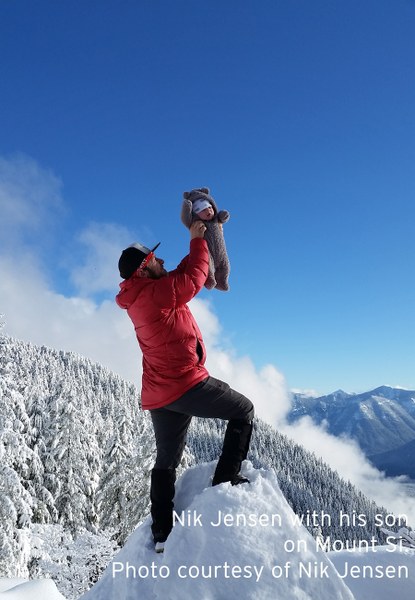
by Kristina Ciari, Mountaineers Director of Communications
One step at a time. It can be slow, and often painful, but you can always take one more step. That’s how you climb mountains, and that’s how you recover from addiction.
Nik Jensen knows the trials and tribulations of both.
I don’t remember meeting Nik, suffice to say one day he was part of my outdoor community, and my life is better for it. He’s like the Kevin Bacon of the outdoors. You probably know Nik, and if you don’t, you definitely know someone who does.
Nik is the type of guy who enthusiastically gives you three hours of his Sunday morning to talk about life, climbing, family, addiction, and recovery. He welcomes you into his home with a plate of bacon, eggs, and his secret French toast recipe. It wouldn’t be an exaggeration to call it some of the best French toast in the Pacific Northwest.
Getting His Bearings
Nik grew up in the outdoors. With a Scoutmaster for a father, Nik was actively involved in cub scouts and boy scouts. He spent many weekends hiking, camping, and shooting.
The smallest boy in all of his classes, Nik was picked on in elementary school. As a result, he was extremely shy and often felt out of place. He learned that acting out would get attention and time away from the mean kids. He eventually channeled that energy into something more productive in middle school, joining the wrestling team.
The discipline of organized sports in high school helped Nik come out of his shell. He played football and sang in the vocal jazz group and was active in his church youth group. Nik wasn’t part of the popular clique, but had a lot of friends and was well known. He didn’t have time for much in the outdoors anymore, but he seemed to be on the right path.
Then, three pivotal things happened his senior year. First, he crashed his car. It was early on the morning of Homecoming, and Nik drove into the back of a school bus. He was 100% sober at the time, but it happened right in front of the school. Every student walking and driving by that morning saw Nik standing next to a wrecked car talking to the cops. I cringed when he told me this, thinking back to my own embarrassing high school moments, and feeling like they paled in comparison.
Second, he lost a wrestling match, punched a wall, and broke his hand. The match had gone into double overtime when he was eventually taken out, and he was so angry but didn’t know how to channel it. The broken hand meant he was out for the rest of the season.
Last, his youth pastor left his church. This changed the dynamics of the most stable part of his life. The foundation around him crumbled.
He started to hang out with the wrong crowd. The cigarette-rolling, weed-smoking, booze-drinking, party-on-the-school-yard-after-hours crowd. He began using. First, it was just smoking weed, but pretty soon it turned to drinking. “I enjoyed it because it made me feel like someone I wasn’t,” said Nik. “It was a solution to years’ worth of insecurities. It made me feel like a different person, and I liked it.”
Way Off Track
Nik tried everything under the sun, save for opiates. He spent much of his late teens and early twenties partying. The cops were called to his 21st birthday party, and he was lucky to get off without being arrested. After that he swore off all drugs, doubling down on alcohol to get his fix.
When he was 24, Nik met a girl and started a relationship. He pared down his drinking. They moved in together, and six and a half years later they bought a house. Three days after signing the paperwork she dumped him over the phone while he was on a work trip. She moved him into the new house while he was out of town, left a note on the counter, and disappeared. He came home to a new house filled with his stuff that in no way resembled his former life.
“I had never experienced a broken heart before. It felt like my chest was ripped open and my heart shattered into a million pieces. The pain, physical and emotional, was unbearable.” Nik called a friend who came over with weed in tow. He started using and drinking again, heavily. Within a month, Nik had his first DUI. He was 29.
A quick stint in jail and Nik was back at it again. A bunch of friends had moved into his house to help pay the mortgage, and they partied. One night someone brought cocaine. It’d been over a decade since Nik had used any of the hard stuff and he went for it. “Wow, this is the best feeling,” Nik remembered thinking. “I need to maintain this feeling at all times.”
Into the Abyss
Nik’s cocaine habit began immediately. Cocaine is expensive, so dealing it as a means to an end seemed like the next logical progression. Nik would buy an ounce of cocaine for $800, break it into grams, and sell it to friends. “I could use as much as I wanted and still make money. I could turn $800 into $1600 in a week. It was easy to get sucked into the game.”
Nik never got to the point in his addiction that led him to rob or steal. He realized early on that it was easiest to just show up at work, even if you’d eventually get fired. He went to work for his dad, and was always sneaking off to do something. “I have to go to the truck to get a tool. I have to go to the bathroom….again,” he would tell people. “I was sneaking off a lot. I was using it around the clock 6 days a week, and I would sleep on Sunday. I decided not to sleep at all and I would stay high until I didn’t have to work anymore. Then I would crash.”
His Dad caught wind of what was going on and cornered Nik, demanding to know what was wrong. “I couldn’t lie to my dad. It was probably one of the lowest points in my life having to admit to him that I was addicted to cocaine.”
After that conversation, Nik quit cold turkey.
Cold turkey, that is, when it came to cocaine. Nik went back to drinking but tried his best to keep it in check. He’d always been a social drinker — he never drank at home alone — and as such he drove frequently while under the influence. He got a second DUI, then a third.
Afraid of losing his house, Nik got a lawyer who brokered a deal for a deferred prosecution. This came with two years of outpatient treatment and 5 years of probation. The crux of the sentence, however, was that Nik had to admit to being an alcoholic. “That part was the hardest for me. I thought that alcoholics need booze, and I never needed it. I just used it as a solution to my problems. As a band-aid.”
The truth is alcoholism shows itself differently to everyone. When Nik used alcohol, he found himself in negative situations. “It led to a life-pattern of unmanageability.”

Climbing Back Out
Nik went to the required AA meetings where he struggled to identify with stories of people needing alcohol. Then he heard of Narcotics Anonymous. At the NA meeting people talked about changing their lives, and how they were able to quit using and completely lose the desire to use. They had found a new way to live. He wanted that too.
Nik went all in. He got a sponsor, accepted a volunteer service position, and started working the 12-steps. “I did it the only way I know how to do it, which is to jump in with both feet.”
He was spending 3-4 hours, 3 nights a week, plus weekend days, investing in his recovery. Outpatient treatment gave him the tools he needed to get clean and sober and stay that way. The true saving grace was the fellowship and the anonymous 12-step programs. “They really taught me how to live and how to change my life.”
At his 6-month sober date, he got the flu while staying at a friend’s house. She offered him prescription cough syrup containing Vicodin. Not thinking it was a big deal, he took the recommended dose and finally got some sleep. When Nik told his sponsor, Nik was surprised that his sponsor felt this counted as a relapse and that Nik needed to change his sober date. Nik thought long and hard about it and decided to change his clean date. He shares this story often in meetings. “It came down to brutal honesty in recovery. I didn’t want to have any exceptions. I share this choice to inspire other people who may be struggling and have to make tough decisions in their own recovery.”

One Step At A Time
Early in his recovery, Nik learned of an AA meeting hosted at the top of Tiger Mountain on Sunday mornings. “I showed up and I was probably wearing cotton clothes,” he said. When he arrived he saw 30-40 people having a meeting at the top of a mountain in the middle of the forest.” People offered me blankets and their jacket and gloves. They made me hot cocoa. It was the coolest group of people I had ever met. They started talking about how the outdoors had been therapeutic in their recovery.” Some of the attendees were graduates from the Glacier Climbing Course (GCC) from One Step at a Time (OSAT). Nik thought it sounded like the perfect opportunity to meld his two passions: the outdoors and recovery.
Started in 1991, OSAT is comprised of both an outdoor club and an affiliated, but separate, AA group. Like The Mountaineers, OSAT offers a basic climbing course and Nik couldn’t wait to get involved. He signed up and learned everything from knot tying to navigation to crevasse rescue.
“Climbing is such an awesome metaphor for recovery. We’re climbing an insurmountable mountain of fear, insecurity, doubt, and pain (from the wreckage that we’ve caused), so as we’re climbing mountains in our recovery we can also be climbing mountains in reality. Getting into nature is so therapeutic because it puts you in touch with the earth at a primeval level. It gets you out to breath the fresh air and accomplish something you didn’t think you could do. It goes a long way towards believing in yourself.”
All five graduation climbs on Mt. Baker got rained out that year, so Nik was especially excited to go for Rainier. His team went up the DC route and made it to the summit. That experience was life-changing. “I cried. The Rainier Climb was the culmination of a childhood dream. It was so surreal to me that just a year before I was hanging out in bars trying to be someone I wasn’t and now I was standing at the top of Mt. Rainier clean and sober.”
He went from lacking self confidence and having lots of self loathing and depression and insecurity, to laying on the side of the mountain watching a show of falling stars and aurora borealis with a group of people who cared about him, his wellbeing, and his sobriety. A real transformation took place.

Inspiring Others
Today, Nik has been clean and sober for 6 and a half years and has stood on the summit of his life-changing mountain every year since his fateful climb in 2012. He graduated from GCC in 2012 and started instructing the following year. In 2014 and 2016 he served on the GCC committee as Conditioning Chair and Safety and Standards Chair, respectively. In 2015 and 2016 he also served on the OSAT Board. “It’s been absolutely fulfilling for me to give back what was freely given to me,” he said.
In 2014 he joined The Mountaineers and tested into our Intermediate Climbing course. In the first year he completed all of the field trips – a pretty remarkable feat. He credits his mentors, like Nick Howard and Stan Hummel and Fred Luck, for helping him along the way. “Having mentors in The Mountaineers just solidified that I was in the right place. They were so thorough and so safe, just really really great teachers. It inspired me even more to give back.”
Nik joined The Mountaineers to bring his knowledge back to OSAT and to start teaching rock climbing, since they currently only teach glacier climbing. He is set to kick off OSAT’s first Intermediate Climbing Course in 2018. He’ll stick around as a climb leader for The Mountaineers too. He’s hooked. Today, he says he can’t go to a Mountaineers event without knowing 30-40% of the people.
The truth is, Nik is an inspiration and is sought out by many. He bravely shares his story without apologies in order to help other people. A lot of people – many he barely knows – reach out to ask about staying clean and sober. “I’m happy to take time out of my life to talk to them. I always have time for the struggling addict or alcoholic.”
Nik has added incentive to stay sober. He met a wonderful woman in his GCC course, Aggie, and together they have an adorable 1-year-old son, Tristan. “I’m enamored watching him grow. I’m going to do whatever I can to share my love of the outdoors with him. I want Tristan to understand how therapeutic the outdoors can be. And of course, I’d love for him to be the next Kai Lightner or Ashima Shiraishi. Maybe he can lead me up some 5.11 stuff that I’ll probably never climb.”
Nik and Aggie have a wood sign in their living room that says, “High in the mountains life becomes very clear. The higher you go the more you can see.” It’s clear that Nik can see a future for himself and his family. “I’m really proud to be clean and sober because this little guy will never have to see me loaded,” he says, cradling a now-sleeping Tristan on his chest. “At the lowest point of my addiction, I was not a cool person to be around. I was a waste. And this little guy never has to see that as long as I keep living this same way that I live, one day at a time.”
Add a comment
Log in to add comments.Applause to your story and overcoming your obstacles. I do a park program on Nature's Therapy... research studies on mental, physical and soul health are fresh and abundant. May you continue to strive and share the benefits of these special places...in hopes they may provide for future generations.
Thank you so much, Julie!
 Kristina Ciari Tursi
Kristina Ciari Tursi